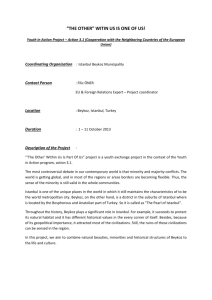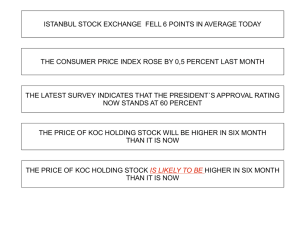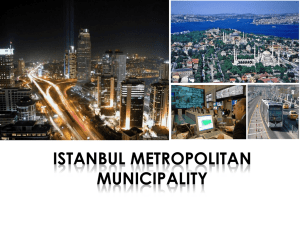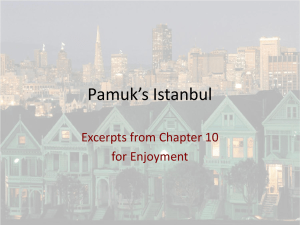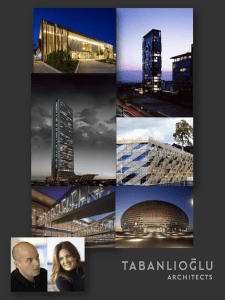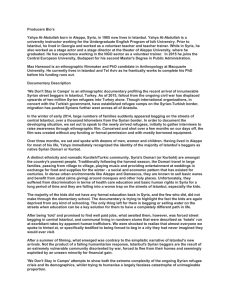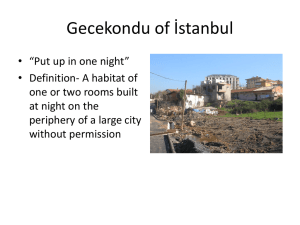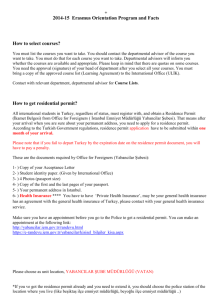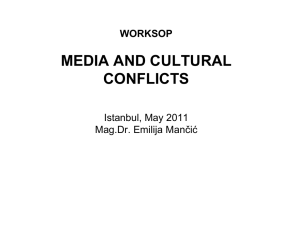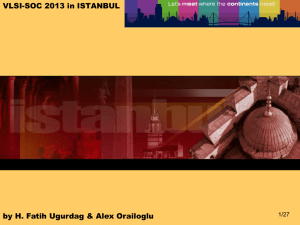Right to the city as an urban utopia
advertisement
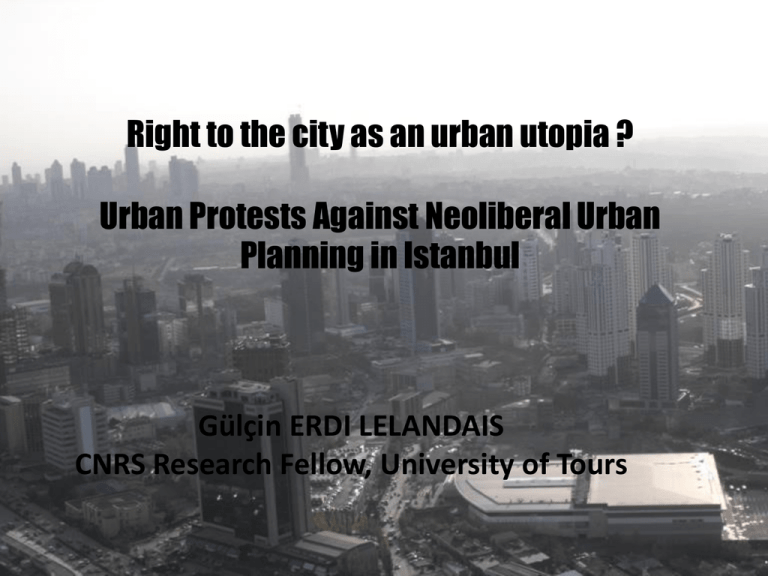
Right to the city as an urban utopia ? Urban Protests Against Neoliberal Urban Planning in Istanbul Gülçin ERDI LELANDAIS CNRS Research Fellow, University of Tours Presentation of the Research and the Methodology • Research undertaken between 2010-2012 • Aim of the project : -Questioning the role of space and identity in resistances against public-planning -Studying the nature of urban planning and its effects on urban dwellers -Interrogating if these resistances give rise to the new forms of citizenship -Interrogating the links between the claims in the neighbourhoods and the « right to the city » Colloque Engagements et tensions autour de la rénovation urbaine, 25-26 Janvier, Paris Case Studies Sulukule 1 mayis Colloque Engagements et tensions autour de la rénovation urbaine, 25-26 Janvier, Paris Fieldwork : Sulukule and 1 Mayis Neighbourhoods in Istanbul 1 Mayis Sulukule Evolution of Urban Transformation in Turkey from 2000 • Milestone in urban policies : 2002 and AKP’s arrival • Institutionalisation and consolidation of Neoliberal Urban Regime • Massive Destruction of Gecekondus and Struggle Against Illegal Housing • Emergence of TOKI (Institution of Collective Housing) as a main political actor in urban policies • AKP practices neoliberal rules without concession; • Progressive privatisation of housing sector Following... • Changing the structure of TOKI by law in 2003 : permission to build beneficial housing consortiums with private firms; • Right to conceive and to realise urban transformation projects for municipalities; • Several laws in order to consolidate neoliberal urban order (2004 : construction of a shantytown considered a crime, 2006 : Mortgage Law, 2003-2008 : Accession to property for foreigners). • Privatisation of public land properties; • Decentralisation of industry in urban space; • Worker / lower middle class housing in peripheral areas; • Targeting city centres for luxury constructions; • Growth of Construction Sector (CS) and gross national product (GNP) : 2001 (economic crisis): CS -17,4 % ; GNP -5,7% 2002 : CS 13,9% ; GNP 6,2% Résistances against urban planning • Two main characteristics of these projects : - profit priorities - authoritarian - directed in poor, minority-concentrated neighbourhoods • This situation provokes reaction in some neighbourhoods • Especially minorities having the feeling to be denied and oppressed since the foundation of the republic are raised against these projects to protect their place of dwelling considered as the only place of expression of their ethnic and cultural identity • So the city becomes the space for new forms of expression and an insurgent citizenship emerging against established rules of political and societal system. Reclaim the right to the city ? • How to define the right to the city ? - a concept which could not be reduced to a right of housing -Henri Lefebvre (1968): a mode of being for all city residents. “The promotion of equal access for all to the potential benefits of the city, the democratic participation of all inhabitants by decision-making processes, and the realization of inhabitants’ fundamental rights and liberties”. - reworking the social construction of urban space -opposition to the conception of capitalist urbanization Right to the city as a mobilization tool • Right to the city as a slogan, an “agenda for the mobilization against neoliberalization” (Purcell 2008) • Right to the city as an unifying element for urban social movements • Multiplicity of perceptions of right to the city • Right to the city as an alternative urban project and conception against urban policies of the government Perception of actors • Two main understanding : - against the exclusion from decision-making processes on the use of space, led by the exchange value, as the right to modify and shape their living spaces and the city, based on their ideas and needs. - against their spatial eviction and social expulsion from the “centre” of the city; they refuse to leave their central urban spaces for new social houses which will be built outside Istanbul Çiğdem from Fener-Balat and Urban Movements: “The right to the city has a different meaning for me. But for the neighbourhood may be different. As Harvey said, it is the right to build our own city by building oneself, ourselves. In fact, we produce; build ourselves according to the amenities, possibilities around us. If in our city, these are not offered freely to me, but according to my money, to class, this means that obstacle and limits are set down upon me. In that sense, human being must have the right to say his opinion about how his/her living milieu is being shaped since this transformed city will shape him/her. If man/woman is shaped by shaping his/her city, is formed by forming it, he/she must participate in decision-making processes, to be asked about the formation of his/her city, he/she must be able to contribute in it, so in the formation of the right to the city, we must have the right of decision and to say our own words. It is a crucial right since this city at the same time will shape me.” (Interview made by Basak Ergin with Çiğdem, April 2012, Istanbul) Erbatur from Solidarity Studio: “The right to the city is a revolutionary right, not a mere right of dwelling; right to access to centrality or to the urban services. It must be elaborated as related to the use-value of space with a democratic urban imagination. Urban struggle must aim the right to the city, targeting a more democratic, just city based on the use value.”(Interview made by Basak Ergin with Erbatur Çavuşoğlu, April 2012, Istanbul). Whose right to the city and how ? • An empty concept ? • Develop an alternative project • Finding the realisation mecanisms of right to the city • Role of inhabitants and professional activists THANK YOU ! gulcin.lelandais@univ-tours.fr
